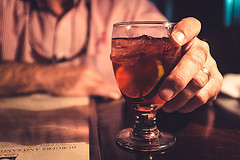ALCOHOLISM: the Subtle Lure
No one ever plans to become an alcoholic. But how do they end up that way? For some, you could possibly trace back their first drink to peer pressure or just plain curiosity. For others, they could attribute the early beginnings of their drinking to family get-togethers where drinking was encouraged by relatives or family members. But no matter what the reason, one thing is for certain: alcoholism all started with just one drink, that later grew into a habit… a seriously harmful habit.
It is no wonder then why millions are spent on advertising alcoholic beverages. It is an orchestrated effort to make drinking so alluring. Television advertisements are carefully crafted to give the illusion that drinking is fun and ‘cool’ — where young men and women are depicted as having a great time during a night out with friends with drink in hand. Yet in reality, the image of alcoholism is not attractive at all. It can even be outright ugly. Because of the lure of alcohol, it is not uncommon to find shirtless men guzzling down several bottles of beer at a street corner while idly drinking the day away. Even so-called urbanites who have had downed one-too-many drinks may end up vomiting on the sidewalk, relieving themselves on the street, or sometimes getting themselves embroiled in a street fight. It is unfortunate that a number of these friendly social gatherings can end up with someone getting hurt, even killed – all because someone had a little too much to drink.
According to the 2011 World Health Organization report, Filipinos ranked as the second highest consumer of alcohol in Southeast Asia, while Indonesian ranked first. Out of the 90 million Filipinos, it is reported that 5 million were alcohol drinkers, preferring beer over hard drinks because of its affordability. Meanwhile, Filipinos also ranked as the top wine drinker in the whole Asian Region.
Alarmingly, around 2.5 million people die yearly due to abusive alcohol use, making it a direct cause of about four percent of deaths worldwide. Globally, it is estimated that 320,000 young people aged 15-29 years old die every year from alcohol-related causes, resulting in 9 percent of all deaths in that age group.
Alcohol abuse or Alcoholism is defined as having signs of dependence in alcohol and its excessive usage despite the negative effects in one’s body. Though there is no specific cause as to why people become alcoholics, a study suggests that genes are a contributing factor in increasing the risk of alcoholism, but the reason is still unknown.
Though alcoholics rarely admit to their drinking habit, there are many signs and symptoms to look out for. According to the National Center for Biotechnology Information (NCBI), those who abuse alcohol display the following:
• Continue to drink, even when health, work, or family are being harmed
• Drink alone
• Become violent when drinking
• Become hostile when asked about drinking
• Are not able to control drinking — being unable to stop or reduce alcohol intake
• Make excuses to drink
• Miss work or school, or have a decrease in performance because of drinking
• Stop taking part in activities because of alcohol
• Need to use alcohol on most days to get through the day
• Neglect to eat or eat poorly
• Do not care about or ignore how they dress or whether they are clean
• Try to hide alcohol use
• Shake in the morning or after periods when they did not have a drink
• Memory lapses after heavy drinking
• Needing more and more alcohol to feel “drunk” (increased tolerance)
• Alcohol withdrawal symptoms when you haven’t had a drink for a while
• Alcohol-related illnesses such as alcoholic liver disease
Drinking wine or an alcoholic beverage per se is not bad. An occasional small glass of wine may even be good for your health, some experts claim. But those prone to drunkenness should stay away from alcoholic drinks all together.
Alcohol abuse is bad news. The operative word would be ‘abuse.’ When you can no longer say “no” to a drink and your life seems to revolve around the next drink, then it is time to seek professional help and possibly go through rehabilitation and the twelve-step program.
THE TWELVE STEP PROGRAM
Bill Wilson, having struggled with alcoholism, co-founded the Alcoholics Anonymous (AA) together with Dr. Robert Smith, and then later developed the twelve-step program based on teachings he learnt from the Oxford Group, a Christian fellowship founded by American Christian missionary Dr. Franklin Nathaniel Daniel Buchman.
These are the original ‘Twelve Steps’ as published by Alcoholics Anonymous:
1. We admitted we were powerless over alcohol—that our lives had become unmanageable.
2. Came to believe that a Power greater than ourselves could restore us to sanity.
3. Made a decision to turn our will and our lives over to the care of God as we understood Him.
4. Made a searching and fearless moral inventory of ourselves.
5. Admitted to God, to ourselves, and to another human being the exact nature of our wrongs.
6. Were entirely ready to have God remove all these defects of character.
7. Humbly asked Him to remove our shortcomings.
8. Made a list of all persons we had harmed, and became willing to make amends to them all.
9. Made direct amends to such people wherever possible, except when to do so would injure them or others.
10. Continued to take personal inventory, and when we were wrong, promptly admitted it.
11. Sought through prayer and meditation to improve our conscious contact with God as we understood Him, praying only for knowledge of His will for us and the power to carry that out.
12. Having had a spiritual awakening as the result of these steps, we tried to carry this message to alcoholics, and to practice these principles in all our affairs.
The twelve-step program has provided hope for many alcoholics, countless lives have testified to this. However, much like a hurricane, alcoholism can leave a trail of victims in its path. Rehabilitation can prove to be a long, tedious and even painful process for some. Besides that, repairing relationships and restoring trust is not an overnight thing and can take some time. My advice: the best way to stop drinking is to never start at all.
_________________________________
References:
Alcoholism and alcohol abuse. (2011, March 20). Retrieved August 3, 2012, from National Center for Biotechnology Information http://www.ncbi.nlm.nih.gov/pubmedhealth/PMH0001940/ ZENAROSA, H. P. (2011, February 16). Alcohol statistics. http://www.aa.org/en_pdfs/smf-121_en.pdf

